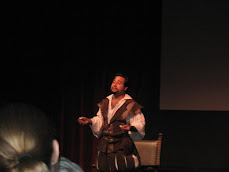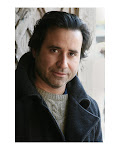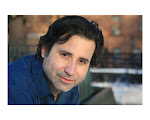GableStage and the New Theatre on plucking your eyes out
The Quarrel is aptly named. Its two protagonists spend the play's 90 or so minutes walking through a big park in Montreal arguing about God. Does He exist? Does He intervene in human affairs? And if He does exist and He does intervene in human affairs, is He worth worshipping?
These rather serious questions take on some urgency when you consider the men asking them.Rabbi Hersh Rasseyner and journalist Chaim Kovler are former best friends, long estranged due to theological differences. Each thought the other was dead. It is 1948, and they are Holocaust survivors. Kovler saved himself by leaping around Europe and keeping one step ahead of Hitler. He could not save his family. Rasseyner, also alone among his family, managed a jailbreak from Auschwitz. By freakish coincidence, they have found themselves on the same cloudy afternoon walking through the same Montreal park (it might be Mont Royal, because somebody mentions there's a cross in the middle). And after their initial delight, they resume their old argument.
If the script of The Quarrel has a problem, it's that it places Kovler's humanism and Rasseyner's religious dogmatism on equal footing, as if each had its points. Kovler does an OK job of pointing out Rasseyner's problems of theodicy, but Rasseyner's smackdowns of logic and reason are difficult to take seriously. To one who lives by reason alone, he points out, it would make sense to murder all unhealthy babies. (Really? Is it reasonable to make the world so brutish and ugly that no one would want to inhabit it?)
But forget the theological argument. Anyone who cares about such things will have heard it before anyway. The Quarrel's beauty lies in its learned, passionate language; elegiac tone; and utter sincerity of its leading men. Chaz Mena, who plays Kovler, is revelatory: Big, strong, and with a warm and resonant baritone, he projects both confidence and an almost invisible pain — a reminder of how hard Kovler's confidence was to come by. As a humanist, Mena's Kovler tries desperately to become a powerful, capable, and just man. As the rabbi, Hoffman is Kovler's inverted double. He seems smaller than his true dimensions, almost disappearing behind his beard, locks, hat, and jacket. If the Holocaust has convinced Kovler that humanity must take control of its destiny, it has convinced Rasseyner that humanity must never be trusted.
Yet he has a fiery and jolly sense of humor when he forgets he's supposed to be withdrawing from the world. One senses there is something salvageable between these two men. As they walk through Lyle Baskin's lovely park-scape set — full of gentle curves and the silhouettes of trees, bridges, and small gazebos — there is a sense that, for all their differences, they share an understanding that they either can't or won't articulate.






















No comments:
Post a Comment